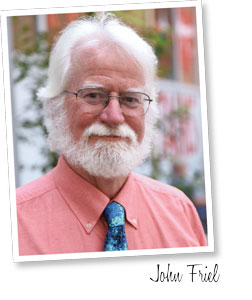7/1/2023
Plenty of Nothing to Do
John Friel

My new gig is pretty good. I recommend it highly. It’s called “retirement.”
I can delve more often into pursuits formerly relegated to spare moments. Firewood stacking, once pretty much the equivalent of filling an oil tank, has become almost a meditative art form. Birdwatching is an actual focus, not merely an occasional whiplash-inducing moment while driving to work. And I’m finally building the wood-strip canoe I’ve been making in my mind for decades.
Firewood
Wood stacking is one of those Zen-infused pursuits wherein the hands work while the mind wanders free, occasionally weighing in on proper placement of a gnarly billet, but otherwise off-leash. While my hands built a holz hausen—a fancy term for a round stack—my brain engaged itself in a lengthy conversation about how the godly and the godless scorn and pity one another, which is neither unlike nor totally separate from our chronic political disconnect.
I was unable to determine any way to improve on those situations or even to decide if they’re improvable. My hands were more successful: The holz hausen was taller, tidier and tighter when I stopped than when I began. Meanwhile my thoughts, and a piece of writing I was working on, remained an amorphous mess.
Luckily prose is composed of words, which can be infinitely rearranged just as jumbled heaps of firewood can be transformed into orderly, symmetrical, stable stacks. Unlike cordwood, however, prose is constructed from the top down and is more likely to be improved by reduction than by addition.
Birds
Birdwatching—or just “birding,” as birders say—is addictive. Every bluebird is the bluebird of happiness. Birding takes over large parts of people’s spare time and a significant share of their disposable income, which explains why, IMHO, a garden center sans birding supplies feels incomplete.
See, there are no uninteresting birds. From towering sandhill cranes to deceptively delicate hummingbirds, or the petite Carolina wren whose song is five times bigger than its body, from desert-dwelling owls to common loons who hunt fish 200 feet underwater. From brilliant to drab, they’re all impressive. Could you build a home that looks exactly like the home you grew up in—with no hands?
There are exasperating birds, like the raucous grackles who rob my woodpecker feeders, and reprehensible ones, like the striking brown-headed cowbird. I like them; many birders don’t. On a recent jaunt in New Jersey, timed to coincide with coastal spring migrations, our guide spat out the name as if he were cursing.
Admittedly, by human standards, cowbirds are despicable. They’re brood parasites: They lay their eggs in other birds’ nests, leaving the unwitting hosts to raise their young. Definitely not role-model material, but is it fair to apply human moral standards to other species when our own so often fails to meet them?
Far worse is the European starling, whose disruptive presence in all 48 contiguous states is usually blamed on Eugene Schieffelin, who shipped in flocks from England and freed them in Central Park in the late 1800s. Birders like to picture him skewered on a slow spit in hell. But Schieffelin wasn't the only nut job deliberately inflicting starlings on North America. Whole societies were devoted to that now-inexplicable cause. His story is a graphic demonstration of the Law of Unintended Consequences and of the danger of believing urban legends.
Besides, even starlings—so invasive they’re topped perhaps only by Homo sapiens—possess at least one redeeming talent, which you can witness: Sic your favorite search engine on “starling murmuration” videos and prepare to be mesmerized.
This gig is still new enough to seem like the other side of the looking glass. I’ve attended one hort trade show, and it felt great to be just an aisle-strolling tire kicker with no booth to mind, no axe to grind. If I make the Perennial Plant Association’s National Symposium, after years on the Board, as an exhibitor and occasional speaker, it’ll be equally sweet to be just another attendee riding the bus, taking pictures, scribbling notes.
And once this canoe is finished, I may even—finally—become something of a gardener. Some people apparently prefer it to stacking firewood. Or writing. GP
John Friel is a freelance writer with more than 40 years of experience in horticulture.